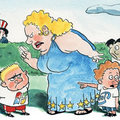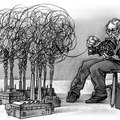BELFAST, Northern Ireland, March 26 — After years of mutual hostility and recrimination, the leaders of Northern Ireland’s dominant rival groups, Sinn Fein’s Gerry Adams and the Protestant leader, the Rev. Ian Paisley, met today for their first face-to-face talks and agreed to form a joint administration for the province on May 8.
The deal was hailed by Britain and Ireland as a historic breakthrough, more than four years after Northern Ireland’s local government was suspended in October, 2002, after a dispute over espionage activities by the Irish Republican Army.
“The word ‘historic’ has to be used,” said Brian Feeny, a historian at St. Mary’s University College in Belfast, “It was the only way it was ever going to work. The two leaders of the two traditions had to do the deal.”
If implemented, the agreement means Britain will formally hand back responsibility for running many of Northern Ireland’s internal affairs to an administration composed of Protestants and Catholics, with Mr. Paisley, the leader of the biggest party in the province, as First Minister and Martin McGuinness, Sinn Fein’s chief negotiator, as his deputy. Other smaller parties will also have seats in the government proportionate to their electoral showing.
“Today the clouds have lifted and people can see their future,” said Peter Hain, Britain’s Northern Ireland minister. British officials depicted the agreement as critically different from many previous false starts because the two main parties had made the deal themselves in direct talks that broke the province’s long-standing taboos on such encounters.
“The first time the two parties have ever met is today,” Prime Minister Tony Blair’s official spokesman, who customarily requests anonymity, told reporters in London. “In the past, it’s been us imposing dates on the parties. The crucial difference today is that this was an agreement reached by the parties themselves.”
The deal was announced by Mr. Adams and Mr. Paisley as they sat close together at a diamond-shaped table in the Stormont Parliament building — a sight that would have seemed impossible in the days when Mr. Paisley labeled Mr. Adams and his followers terrorists because of Sinn Fein’s affiliation with the I.R.A.
Such was Mr. Paisley’s opposition to any kind of settlement with Sinn Fein that he earned the nickname “Doctor No.” He was renowned for railing against the Vatican and what he called “popery,” once labeling the Roman Catholic Church “the mother of harlots and the abomination of the earth.”
While the province’s leaders failed to meet a March 26 deadline set by Britain and Ireland to restore local government, the fact that the two men named a date themselves — and sat together to say so — was taken as what Prime Minister Tony Blair of Britain called “a very remarkable coming together of people who, for very obvious reasons, have been strongly opposed in the past.”
Indeed, the sight of the two men, once sworn enemies, sitting feet apart was all the more striking in contrast to the once-familiar images of bloodshed that scarred Northern Ireland for decades. Some 3,720 people died in three decades of sectarian strife known as The Troubles that ended with an I.R.A. ceasefire 10 years ago and the Good Friday peace agreement in 1998.
After reading their statements, Mr. Adams and Mr. Paisley, head of the Democratic Unionist Party, shuffled their papers but did not shake hands. Nonetheless, in prepared statements, they sounded similar, conciliatory themes.
“We are very conscious of the many people who have suffered,” Mr. Adams said. “We owe it to them to build the best possible future. It is a time for generosity, a time to be mindful of the common good and of the future of all our people.”
A few minutes earlier, Mr. Paisley, who had insisted on the delay until May 8, had said: “We must not allow our justified loathing of the horrors and tragedies of the past to become a barrier to creating a better and more stable future. In looking to the future we must never forget those who have suffered during the dark period from which we are, please God, emerging.”
The two men sat in front of a single television camera and one photographer to record Mr. Paisley and Mr. Adams reading their respective scripts. Their meeting took place on the first floor of the Stormont Parliament Buildings, a 1930s structure that was a former symbol of Protestant hegemony in Northern Ireland where the main Good Friday accords were signed in 1998.
At that time, Mr. Paisley’s party rejected the very notion of sharing power with Sinn Fein. In elections five years later, his Democratic Unionists became Northern Ireland’s biggest Protestant party. Since then, in a series of halting negotiations, Mr. Paisley has begrudgingly nudged towards agreement on power-sharing in return for major concessions.
In 2005, the I.R.A. pledged to put its weapons beyond use and to pursue its goals by political means, not armed struggle. Right up until the last few weeks, Mr. Paisley pressed Sinn Fein for further concessions, including acceptance of the province’s policing arrangements, traditionally dominated by Protestants.
At a meeting last October in St. Andrew’s, Scotland, Britain and Ireland laid out a timetable that foresaw the power-sharing administration being revived today. Britain had threatened to restore full direct rule of Northern Ireland if that deadline was not met. But a British official said today: “If there’s a consensus about the way forward the British government isn’t going to stand in the way of that consensus.”
The St Andrew’s agreement also provided for elections earlier this month, in which both Sinn Fein and the Democratic Unionists strengthened their positions as the two most powerful parties in the province. The election strengthened Mr. Paisley’s hand against dissidents opposed to the deal within his own party.British officials maintain that the election three weeks ago also represented a demand from Northern Ireland’s 1.6 million people for the rival parties to end their conflicts and concentrate on local issues such as the price of water-supplies, health and education.
“It’s the triumph of normal politics, and we have waited a long time for that,” one British official said, speaking in return for anonymity. In hectic, last-minute negotiations here, the official said, Sinn Fein had agreed to a delay in return for a firm guarantee from the unionists to share power.
In London, Mr. Blair said: “This is a very important day for the people of Northern Ireland, but also for the people and history of these islands. And in a sense, everything we’ve done over the last 10 years has been a preparation for this moment, because the people of Northern Ireland have spoken through the election.”
“They have said they want peace and power-sharing and people working together and the political leadership has come in behind that and said: Well, we’ll deliver what the people want.”
The two sides remain divided in their basic aims, however, with Sinn Fein pressing for a united Ireland and the Democratic Unionists seeking continued links with mainland Britain.
“This won’t stop republicans being any less republican or nationalist, or making unionists less fiercely unionist,” Mr. Blair said. “But what it does mean is that people will come together, respecting each other’s point of view, and share power, make sure politics is only expressed by peaceful and democratic means.”
The agreement is particularly important for Mr. Blair since he plans to step down in the summer and wants to put in place a legacy that will include an agreement on Northern Ireland, ending a conflict whose roots date to the 17th century settlement of north-eastern Ireland by Protestants from Scotland and England. The restoration of Northern Ireland’s local administration would also fulfill an electoral promise to create local government in Scotland, Wales and Northern Ireland.
Mr. Adams, whose party is also competing for electoral advantage in the Irish Republic, said today’s agreement “marks the beginning of a new era of politics on this island.”
The two sides said that between now and May 8 they would hold meetings on the details of restoring the power-sharing executive and would jointly press the British government for an improved package of incentives to boost the province’s economy, which is heavily dependent on government subsidies.
Referring to his own party, which is affiliated to the I.R.A., and to Mr. Paisley’s Democratic Unionist Party, Mr. Adams said: “There are still many difficulties to be faced but let it be clear — the basis of the agreement between Sinn Fein and the D.U.P. follows Ian Paisley’s unequivocal and welcome commitment to support and participate fully in the political institutions on May 8.”
It is not totally clear why that date has been chosen. It would place the restoration of power-sharing government in Northern Ireland between local elections in Scotland and Wales and a national election expected several weeks later in the Irish Republic. Sinn Fein is also campaigning in that election and may benefit among Irish Republic voters by being seen as a party in the Belfast administration.
Jeffrey Donaldson, who had defected to the Democratic Unionists in opposition to the Good Friday accords, said today’s agreement “is for the next generation. We want to hand on a legacy. I know that the children will not have to endure what people of both sides have suffered.”





